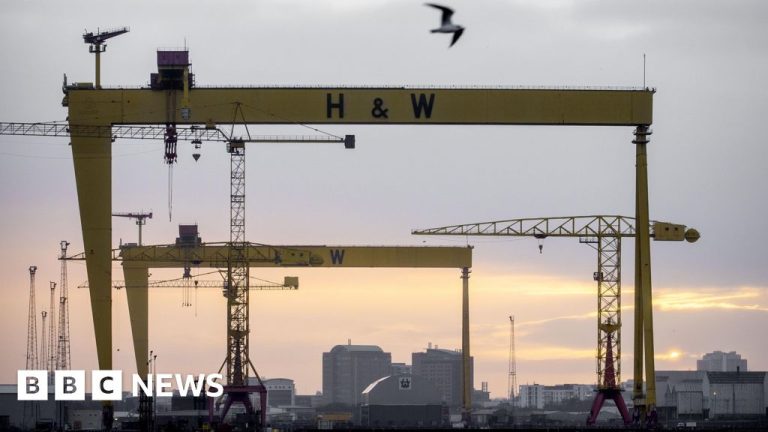PA Media
Navantia already has a commercial relationship with Harland and Wolff
The Spanish public shipbuilder is expected to confirm on Thursday its takeover of Harland and Wolff, the Belfast shipyard best known for the Titanic.
Navantia has been in exclusive negotiations since October after the Harland and Wolff holding company was placed into administration.
The deal is also expected to include Harland and Wolff's facilities in Scotland and England.
Navantia already has a commercial relationship with the company.
Getty Images
Navantia's main shipyard is in Cádiz, southern Spain.
It is the main contractor on a project to build three support ships for the Royal Navy, with Harland and Wolff being the UK subcontractor.
The government could announce that it is improving the terms of this agreement to take into account the increase in costs.
The company employs around 1,200 people in Belfast, Appledore in England and Methil and Arnish in Scotland.
Navantia's main shipyard is in Cádiz, southern Spain.
It employs more than 4,000 people and has an annual turnover of around €1.3 billion (£835 million).
What is the story of Harland & Wolff?
Getty Images
In 2019, H&W's Norwegian owners withdrew their financial support.
Harland and Wolff was founded in 1861 by Yorkshireman Edward Harland and his German business partner, Gustav Wolff.
By the early 20th century, Harland and Wolff dominated global shipbuilding and had become the world's most prolific ocean liner builder.
However, since World War II, the country has lurched from crisis to crisis and was under British state control from 1977 to 1989.
In 2019, its then Norwegian owners withdrew their financial support and the company fell into insolvency, having not built a ship in a generation.
Getty Images
Government could announce improved deal to reflect rising costs
It was bought by Infrastrata, a small London-based energy company which did not have significant experience in marine engineering.
Infrastrata later changed its name to Harland and Wolff and in 2022 won the contract from the Royal Navy as part of a consortium led by Navantia.
However, financial losses mounted as the company expanded its operations and it became increasingly dependent on high-interest borrowing from a specialist US lender, Riverstone.
The company applied for a £200 million government loan guarantee to refinance its borrowings, but this was rejected as too risky for taxpayers.
Its holding company went into administration in September and restructuring expert Russell Downs was appointed to run the business and find a new owner.

